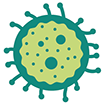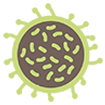Understanding DLBCL
Relapsed/Refractory (r/r) Diffuse Large B-cell Lymphoma (DLBCL)
What is r/r DLBCL?
The immune system is made up of different cells and organs that work together to protect the body from diseases. For example, there are B cells, T cells, and glands called lymph nodes. Sometimes the cells inside a lymph node can grow abnormally and become cancerous.
| T cell |
B cell | |
| Cancerous B cell |
DLBCL, or diffuse large B-cell lymphoma, is a type of non-Hodgkin lymphoma that affects the cells and organs of the immune system. In the United States, DLBCL is the most common type of non-Hodgkin lymphoma. There are different types of DLBCL, including high-grade B-cell lymphoma and DLBCL that arises from follicular lymphoma. Patients with DLBCL have abnormal (cancerous) B cells in their lymph nodes, and potentially in other parts of the body. Patients’ cancer is considered relapsed when they have gone into remission but their cancer has come back, or refractory when they are not responding to treatment.
Antibodies, proteins made by your B cells that help to protect the body against infection; B cells, along with other cells, make up your body’s immune system. They defend the body by producing antibodies; Refractory, your cancer did not respond to treatment; Relapsed, your cancer has returned; Remission, the signs of your cancer have disappeared or else your disease is under control. It does not necessarily mean a cure; T cells, along with other cells, make up your body’s immune system. They are natural defenders that detect and destroy possible threats such as infected or cancerous cells.
KYMRIAH Caregivers
The family and friends of patients with cancer play an important role in their treatment experience. If you are caring for someone with r/r DLBCL, look for the KYMRIAH Caregivers boxes throughout this website. Also refer to the Patient Support section for more information on how best to support your loved one during this time.

KYMRIAH CAREGIVERS
Finding out your loved one’s cancer has returned or hasn’t responded to treatment can be hard on everyone’s mental and emotional well-being. It is important to tap into available resources and practice self-care during this difficult time. Leaning on social and emotional support networks, engaging in physical activity, and connecting with spirituality can be helpful. View a list of advocacy and support groups for more information.


